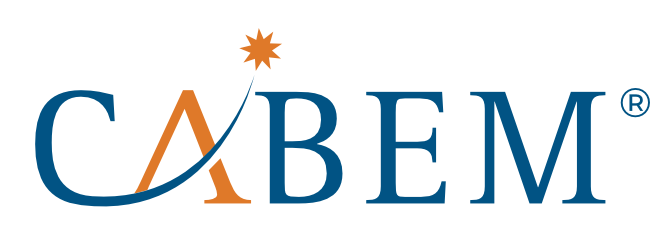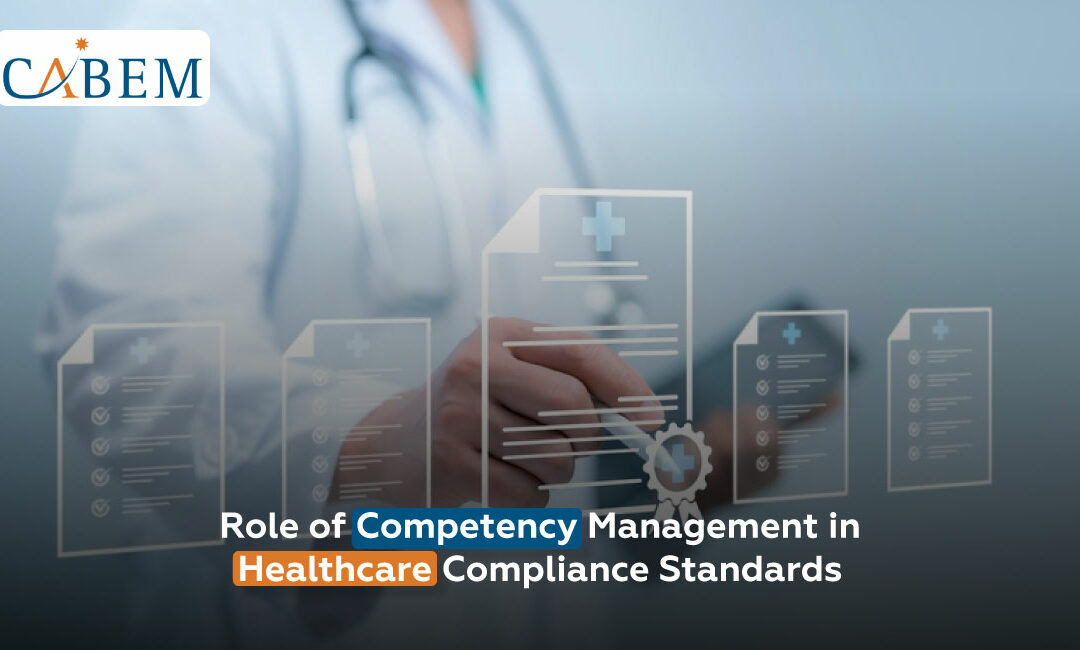Healthcare organizations and care service providers operate under one of the most highly regulated industrial standards. They need to navigate through frequently updated standards that regulate the healthcare industry, from patient privacy to clinical records. The rising volume of compliance obligations is also increasing the complexity of managing them, and one mistake of missing the update on these standards can have huge financial consequences that range from audit failure to even risk in patient care. Relying on the outdated system to fulfill all the compliance requirements is riskier and can even lead to high penalties from regulatory bodies due to not meeting the standards.
At this point, competency management evolves as a core strategy for staying compliant with the standards. A smart competency management system helps in bridging the gap between the existing competency of the workforce and the expectations from regulatory standards by tracking, validating, and reporting the skills across the organization. In the healthcare industry, competency management provides a structured framework that ensures every role, from front-line staff to leadership, has the necessary skills that meet the regulatory standards with confidence.

Why Healthcare Compliance is More Complex Than Ever Before
The healthcare compliance environment has become complex because it is now a complicated matrix of local, state, federal, and industry-specific standards. The time has passed when healthcare could rely on static protocols, but now they have to meet the regulatory requirements of many governing bodies like HIPAA, OSHA, CMC, and others. The standards of these regulatory bodies change frequently and require immediate adaptation from the respective industry. The other complicated thing is that every department of the healthcare industry is governed by its own separate set of protocols, but they all contribute to meeting the overall compliance. Knowing the rules is not enough, but healthcare providers have to prove that every person is ready to follow them.
The advancements in healthcare technology and the evolving models for patient care further make the healthcare compliance standards complex. The increasing trend of telehealth, remote care teams, and digital patient data puts constraints on healthcare organizations not just to train their employees but also make sure that they are certified and competent in data privacy and virtual care. These extra layers make it more difficult to maintain up-to-date records and validate the individual skills of employees without a centralized system. A minor oversight in patient safety, data privacy, and legal liability can lead to major violations that can result in legal action.
The other factor that makes regulatory compliance more difficult is the pace at which they are changing. Healthcare regulations are continuously updated in response to the latest industrial trends, legal rulings, and global events related to health, which is why it is necessary to have compliance strategies that are agile and responsive. Relying on an outdated system often causes gaps in knowledge tracking and reporting, and to avoid this case, healthcare organizations need a system that can link employee training with compliance standards, along with providing the necessary training.

How Competency Management Supports Regulatory Training Requirements in Healthcare
The one-time training is not enough to meet regulatory compliance in the healthcare industry. Continuous and real-time skill tracking and role-based assessment are crucial, which cannot be done without a proper competency management system. An efficient competency management system helps in filling this gap by streamlining the daily operations with mandatory training that makes healthcare organizations fit to the complex regulations.
Role-Based Training Tailored to Compliance Needs
A competency management system ensures that every employee gets training according to its needs and job function because the one-size-fits-all training leads to time wastage. The system also minimizes the redundancy and avoid any slippage of important information through cracks. In this way employees are enable to meet the compliance criteria relevant to their job.
Real-Time Monitoring and Documentation
The regulatory bodies, like HIPAA, OSHA, and CMS, require the timely proof of compliance. The competency management system offers access to dashboards to the administration of the organization, which allows them to monitor the progress and help them to prepare for quick audit.
Closing Gaps in Knowledge Before They Become Risks
A competency management system helps organizations identify the skill gap before it becomes a major problem and hurdle in their compliance management. It not only identifies the deficiencies but also supports addressing them by providing the necessary assessment and training. It fosters an environment of safety and reduces the risk of non-compliance.
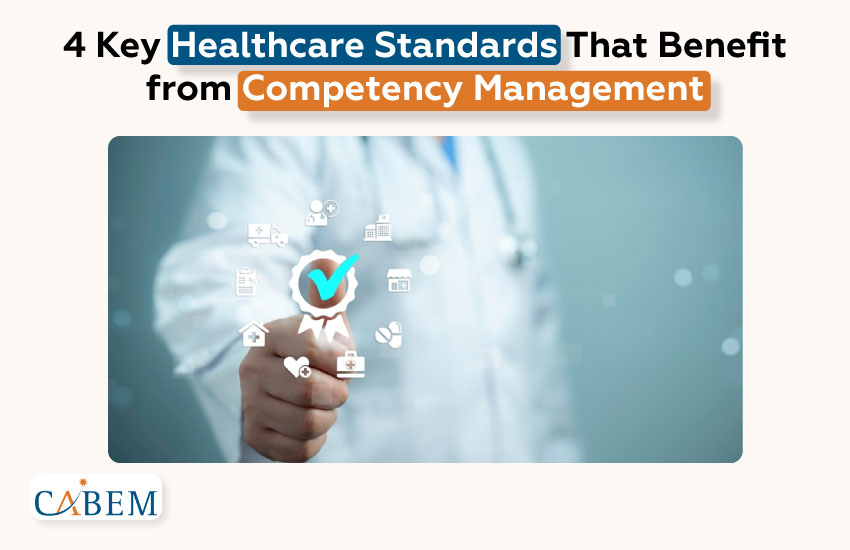
4 Key Healthcare Standards That Benefit from Competency Management
The healthcare regulatory compliance demands proof of performance at the individual level rather than just policies on paper. A competency management system ensures that all the healthcare workers within the organization meet the expectations of all regulatory bodies. By using the performance data of the workforce, it converts it into evidence, which allows hospitals to align the competency of staff with compliance framework.
- HIPAA (Health Insurance Portability and Accountability Act)
- OSHA (Occupational Safety and Health Administration)
- CMS (Centers for Medicare & Medicaid Services)
- The Joint Commission (TJC)
1. HIPAA (Health Insurance Portability and Accountability Act)
HIPAA compliance ensures that all the health records are secure by demanding that every member of the data handling team knows how to protect the health information of people. A competency management system helps in achieving this goal by confirming that all the staff of a healthcare organization, like an administrative team, nurses, and technicians, are fully trained on data privacy and data handling.
2. OSHA (Occupational Safety and Health Administration)
The safety regulations of OSHA require that healthcare organizations that their employees have all the necessary information and training to tackle workplace hazards. A competency system makes it easy to check whether the staff is fully aware of proper safety protocols related to health industry like handling hazardous medical waste and patient related risks.
3. CMS (Centers for Medicare & Medicaid Services)
CMC holds organizations accountable when it comes to the relevant qualifications of medical staff and patient care quality. Competency management ensures that the employees are aligned with CMS expectations by maintaining the record of their licenses, certifications, and most importantly their performance. It presents you the clear view whether your workforce meets the federal standards of delivering care to patients.
4. The Joint Commission (TJC)
The accreditation process of the Joint Commission checks how the medical staff of an organization applies the knowledge of medical standards. A competency management system provides insights into skills, abilities, and ongoing training that demonstrate compliance with the standards of the Joint Commission.
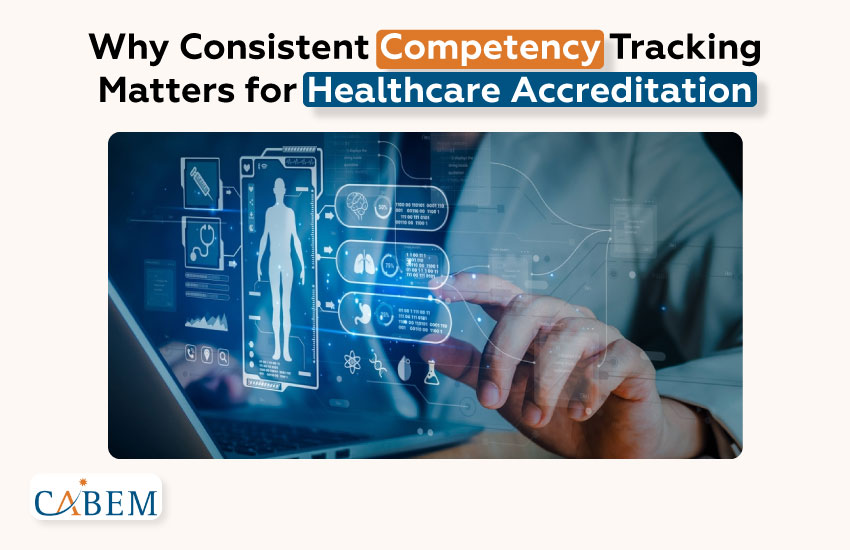
Why Consistent Competency Tracking Matters for Healthcare Accreditation
The accreditation in the healthcare industry is not just a badge of honor, but it serves as the source of credibility, funding, and trust of patients. Competency tracking helps medical organizations in proving the staff qualification and safety preparedness by providing all the necessary documented proof. It also helps in making all the documents ready for a quick audit.
- Demonstrates Verified Staff Qualifications: It provides auditors with real-time tracking that ensures the skills, credentials, and training of employees are up to date.
- Reduces Accreditation Delays and Risks: It organized all the documents and made them available in no time, avoiding last-minute scrambling.
- Improves Readiness for Unannounced Inspections: The consistent competency tracking keeps the organization always ready for unannounced inspections and audits.
- Aligns Workforce Standards with Accreditation Requirements: The consistent tracking aligns the internal standards with the regulatory standards of external regulatory bodies, helping organizations meet the expectations of accrediting bodies.
- Supports a Proactive Quality Management Strategy: It identifies the skill deficit early and allows the organizations to intervene them before they hurts their accreditation.
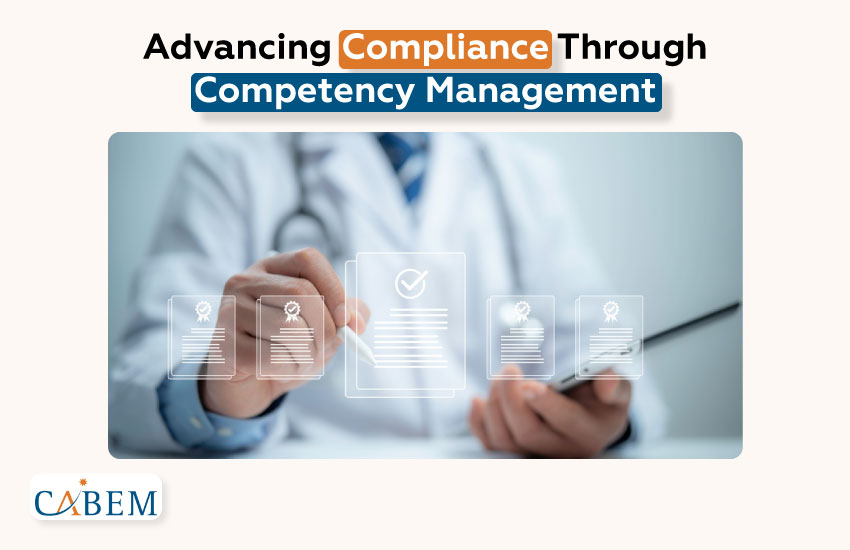
Advancing Healthcare Compliance Through Competency Management
Maintaining compliance nowadays requires more than just checking the list of standards. It demands a structured approach that leads from training to aligning the organization with national and state-level standards. By integrating competency management into the daily operations, healthcare organizations can stay ahead of audits and minimize the risk of noncompliance.
CABEM’s Competency Manager supports healthcare organizations by providing a centralized competency management system that keeps all the records of training and certification, and makes them accessible from anywhere when needed. The flexibility of this platform allows the administration of the organization to look into the training progress of employees and also generate audit-ready reports when needed. Organizations that want to meet compliance standards with ease, CABEM is the best solution for them. Contact us now, and we will let you know how we can help your healthcare organization meet the healthcare regulatory standards.
